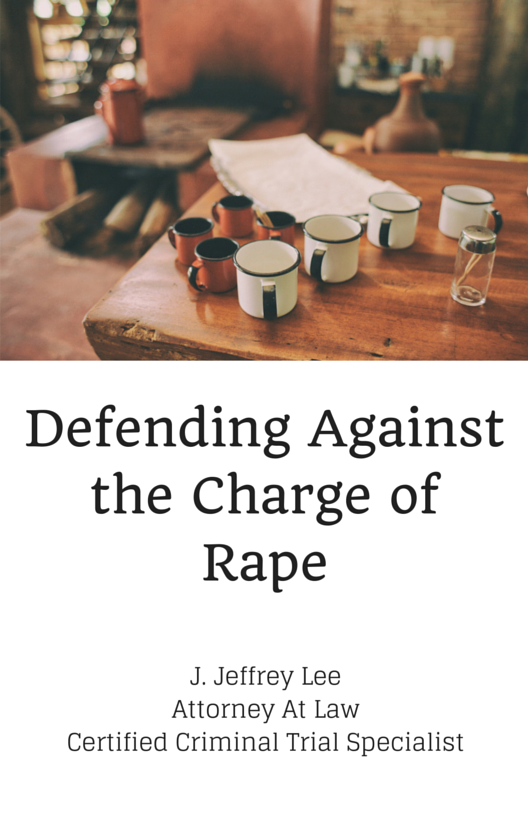Rape in Tennessee Will Make You a Violent Sexual Offender
Rape is the unlawful sexual penetration accomplished by force or coercion, without consent, or by fraud. A person can be charged with rape for a number of reasons, to include a jealous lover, leverage in a custody battle or divorce, a night of drunken lovemaking with different accounts regarding consent, or a sex act that began with consent, which was later retracted.
The offense can be heightened to Aggravated Rape when a deadly weapon is used to commence the alleged act, when bodily injury occurs, when more than one individual assists in the perpetration of the act, or when the victim is mentally defective, mentally incapacitated or physically helpless.
Rape and Aggravated Rape can result in a felony conviction, a prison sentence from between eight to twenty-five years that must be served at 100%, Community Supervision for life, and being placed on the Sex Offender Registry for life as a Violent Sex Offender.
If you have been charged with Rape or Aggravated Rape, please contact me immediately to discuss how we can defend your reputation and your freedom.
I have written an entire consumer guide for individuals charged with this offense, which can be downloaded for free here. You can also read the excerpt on this page below the statute.
Tenn. Code Ann. 39-13-503. Rape.
(a) Rape is unlawful sexual penetration of a victim by the defendant or of the defendant by a victim accompanied by any of the following circumstances:
(1) Force or coercion is used to accomplish the act;
(2) The sexual penetration is accomplished without the consent of the victim and the defendant knows or has reason to know at the time of the penetration that the victim did not consent;
(3) The defendant knows or has reason to know that the victim is mentally defective, mentally incapacitated or physically helpless; or
(4) The sexual penetration is accomplished by fraud.
(b) Rape is a Class B felony.
Tenn. Code Ann. 39-13-502. Aggravated rape.
(a) Aggravated rape is unlawful sexual penetration of a victim by the defendant or the defendant by a victim accompanied by any of the following circumstances:
(1) Force or coercion is used to accomplish the act and the defendant is armed with a weapon or any article used or fashioned in a manner to lead the victim reasonably to believe it to be a weapon;
(2) The defendant causes bodily injury to the victim;
(3) The defendant is aided or abetted by one (1) or more other persons; and
(A) Force or coercion is used to accomplish the act; or
(B) The defendant knows or has reason to know that the victim is mentally defective, mentally incapacitated or physically helpless.
(b) Aggravated rape is a Class A felony.
Excerpt from my Rape consumer guide:
I can only give general advice here without having read the specific facts in your case, but I can say this – as you read this guide, you will probably be surprised at how many things you would like to present at trial but cannot.
Let me begin by saying that many people may not think you, as a rape defendant, should even be entitled to seek legal information on how to defend against a rape accusation.
These individuals are so uncomfortable with the concept of rape that they do not want to get into the details of ‘whether it happened (or didn’t happen),’ and especially ‘why someone might say that it happened even if it didn’t.’
These people may also think that you are a monster for even suggesting that a rape did not occur and making the accuser undergo a trial, because it could result in the accuser’s integrity, character, and personal lifestyle being drawn into question. Instead, they trust that if you cooperate completely without question and submit yourself to every mental, physical, and psychological examination in a “search for truth,” that the inevitable obviousness of a rare, rare false accusation will surely come to light, and you will therefore be cleared in that way. To attempt to counter an allegation in any other way would be in poor taste, this group will say.
On one hand, this group ‘sort of’ knows that you have a right to defend yourself, and they ‘sort of’ understand as a distant concept that not every accusation is truthful, but don’t fool yourself into thinking that you and the accuser are on level ground with this group of people.
But if you were to ask this group to acknowledge these deep-seated prejudices, not only would you highly offend them, but they would deny these feelings and thoughts to the end – and they would probably believe the words of denial as they left their mouths, truly feeling that you will be given the same presumption of innocence as any other person who has been accused of a crime.
And the name of this group of people is “the jury.”
Ten Facts that You Need to Know about Rape
I. The first thing you need to understand about the offense of rape is that after you have been accused of rape – regardless of guilt or innocence – you now occupy a special space in hell reserved for child abusers, that dentist who killed Cecil the Lion, and the proverbial snowball. You have a lot of climbing to do, just to get back to ground level and be seen as a human being again. It’s not fair, but it’s there.
Many jurors do not (or cannot) follow the jury instructions, and presume that you are innocent in the same way that they might against a person accused of stealing a handbag from Target. Now I’m not basing this on some actual quantitative data, but I’m telling you what I see in the courtroom. When potential jurors hear that they may be jurors for a rape trial, you can almost hear the air be sucked out of the room and the room gets twenty degrees hotter.
What this means is that you cannot sit back with a “let the State prove it” attitude and rely on the presumption of innocence. You can’t try not to lose, or try for a tie – be in it to win it, or take the best offer that you get if you can’t stomach going all in. You are fighting more than an intellectual battle of guilty versus not guilty – you are fighting a battle for the hearts and minds of the jury, and that takes a lot more than “Ladies and gentlemen, the State didn’t prove their case today.”
Unless you have an expert witness who can expose the State’s snake oil science, your attorney can catch the accuser in a significant lie (or walk a tender witness through a series of questions showing how they could be mistaken or felt coerced to lie), or basically prove an OJ-level police cover-up, then you will be convicted of rape.
II. The second thing you need to know about rape is that a person can be convicted of rape with very little or even no forensic evidence.
There’s nothing more frustrating than to hear a rape defendant say things like, “They don’t have anything other than the accusation,” as if the State needed more! Banish the thought that the State actually needs forensic (i.e., scientific) proof such as pubic hairs, body fluids, abnormal bruising, or other TV-show flourishes – if the jury believes the accusation, and there is nothing else to support it (a he said, she said), then the State can get a conviction if the jury finds the accuser more credible than you.
Even when a man and woman have sexual intercourse, there can be vaginal bruising whether the sex was consensual or not, so even if no rape occurred, the forensic evidence could still be inconclusive.
Yes, it absolutely helps that the State doesn’t have any of that evidence (unless they do). But what they do have is an accuser crying on the stand, a jury crying in the box, the accuser’s family crying in the pews. It can be very difficult to appeal to the critical thinkers in the room, who decide crucial issues with logic and reason, rather than just “feel sorry” for someone in an unreflective, ‘swallow everything they say as truth’ manner. Some juries don’t understand the burden of proof, the standard of proof, the rules of evidence, courtroom procedure, or jury instructions – they think that a trial is nothing more than figuring out who wears the white hat and who wears the black one. If it’s a tie, you lose.
III. The third thing you need about rape is that no physical injury is required. If an injury occurred, then the charge would be aggravated rape, so the fact that no physical injury occurred doesn’t help reduce it from rape.
IV. The fourth thing you need to know about rape is that the “force” element in the statute is nothing more than the force sufficient to accomplish the act, such as holding a person down beforehand. State v. McKnight, 900 S.W.2d 36 (Tenn. Crim. App. 1994). The victim doesn’t have to be hog-tied for force to exist.
V. The fifth thing you need to know about rape is that you don’t have to “finish” the sex act for rape to have occurred. If a person inserted any part of himself (or herself), or even a foreign object such as a finger, stick, bottle, etc., into another person (oral, anal, vaginal) without consent, then a rape has occurred. Prosecutors are fond of saying “penetration, however slight” to remind jurors that any insertion whatsoever is sufficient.
VI. The sixth thing you need to know about rape is that consent can be withdrawn as easily as it is given. There is no “irrevocable consent,” so even if a person is initially very excited about having sex and gets you worked up, but then later says “Stop,” and the person does not stop, then a rape has occurred.
Consent also cannot be given by a person who is completely passed out, suffering from a mental defect like dementia, or under age (but see Statutory Rape on that one).
VII. The seventh thing you need to know about rape is that it can be accomplished by coercion rather than force.
In a 1994 case, a defendant was convicted for rape and sexual battery because he threatened to tell people that one of his victims was a homosexual if he did not participate. State v. McKnight, 900 S.W.2d 36, 1994 Tenn. Crim. App. LEXIS 759 (Tenn. Crim. App. 1994), Tenn. Code Ann. § 39-13-503.
VIII. The eighth thing you need to know about rape is that it is a completely separate offense from statutory rape – rape is about force or coercion, while statutory rape is about age.
Two recent court decisions distinguished the two in this way: “[s]ince the offense of statutory rape includes an age element whereas the offense of rape does not, and the offense of rape includes the element of force whereas the offense of statutory rape does not, statutory rape was not a lesser included offense in a prosecution for rape by force or coercion. State v. Woodcock, 922 S.W.2d 904, 1995 Tenn. Crim. App. LEXIS 982 (Tenn. Crim. App. 1995). See also State v. Stokes, 24 S.W.3d 303, 2000 Tenn. LEXIS 382 (Tenn. 2000).
IX. The ninth thing you need to know about rape is that sexual battery cannot be a lesser included offense of attempted rape, because sexual battery requires proof that the sexual contact be “for the purpose of sexual gratification,” which is not required for attempted rape. State v. Bowles, 52 S.W.3d 69, 2001 Tenn. LEXIS 586 (Tenn. 2001), review or rehearing denied, State v. Curry, — S.W.3d –, 2001 Tenn. LEXIS 788 (Tenn. Nov. 5, 2001).
X. The tenth thing you need to know about rape is that a person can receive convictions for both rape and incest arising out of the same act, and this does not violate due process under the Tennessee or United States Constitutions because neither offense was “essentially incidental” to the other. State v. Beauregard, 32 S.W.3d 681, 2000 Tenn. LEXIS 662 (Tenn. 2000).
What facts can make the charge more serious?
Rape is a Class B felony. The range of punishment for a Class B felony is “not less than eight (8) nor more than thirty (30) years. In addition, the jury may assess a fine not to exceed twenty-five thousand dollars ($25,000).” Tenn. Code Ann. § 40-35-111.
There are three heightened versions of Rape with additional elements and greater punishments, which include:
Aggravated rape: If the defendant (1) is armed with a weapon or any article used or fashioned in a manner to lead the victim reasonably to believe it to be a weapon; (2) The defendant causes bodily injury to the victim; (3) The defendant is aided or abetted by one or more other persons and either uses force or coercion or the defendant knows or has reason to know that the victim is mentally defective, mentally incapacitated or physically helpless. Aggravated rape is a Class A felony. The range of punishment for a Class A misdemeanor is ” not less than fifteen (15) nor more than sixty (60) years. In addition, the jury may assess a fine not to exceed fifty thousand dollars ($50,000).” Tenn. Code Ann. § 40-35-111.
Rape of a child: If the victim is more than three (3) years of age but less than thirteen years of age. Rape of a child is a Class A felony, but the statute for this offense specifically states that a person convicted of a violation of this section shall be punished as a Range II offender (15 to 25 years) or may, if appropriate, be within Range III (25 to 40 years). A person convicted of rape of a child can also never be released from community supervision and may be monitored by GSP for the rest of his or her life. Tenn. Code Ann. §§ 39-13-522; 40-39-302.
Aggravated rape of a child: If the unlawful sexual penetration of a victim by the defendant or the defendant by a victim, if the victim is three (3) years of age or less. A person convicted of this offense shall be punished as a Range III offender (25 to 40 years). Tenn. Code Ann. § 39-13-531.
Could this charge put me on the Sex Offender Registry?
Rape and Aggravated Rape will both place a criminal defendant onto the Sex Offender Registry as a Violent Sexual Offender. Tenn. Code Ann. § 40-39-202.
Can I get a diversion on this offense?
If you’ve done some research online (perhaps on my website, which is located at MemphisDiversion.com), then you know that judicial diversion is a wonderful program that allows individuals with little to no criminal background to enter a guilty plea in a manner that avoids future jail time and the eventual expunction of the criminal charge upon the successful completion of a probationary period. Tenn. Code Ann. § 40-35-313.
After the criminal defendant enters a guilty plea, the sentence is suspended and the charge would show on a criminal background check as a pending offense (not a conviction). If the criminal defendant is successful, he or she has achieved the same result as winning at trial.
Rape and Aggravated Rape are ineligible for diversion.
What defenses are unavailable?
The most obvious defense is that the alleged offense never happened. This may be the case when both the defendant and the accuser drank or took drugs on the alleged night.
There is also a potential defense regarding the elements above, i.e., was forced or coercion used, or did penetration occur.
The most common defense is that consent was given and never revoked, and that the alleged victim has now changed his or her mind after the sex act, because a parent disapproved, a boyfriend or girlfriend learned of the infidelity, or the person became remorseful and wants to remove his or her own guilt. Rather than own up to his or her own active participation at the time, the accuser is now saying that the act was accomplished by fraud or coercion, so as to make the accuser blameless and non-complicit.
Could law enforcement seize my house or car over this?
Yes. If a criminal defendant was found to have used his or her house or any personal property in the commission of a sex offense against a minor, the real or personal property is subject to judicial forfeiture. The offense must be committed against a person under eighteen (18) years of age on or after July 1, 2006. Tenn. Code Ann. § 39-13-530.
How Does the National Rage Over High-Profile Rape Cases Affect Me?
“What does the verdict of the Vanderbilt Rape Case of Brandon Vandenburg* mean for ME as a criminal defendant?”
Mr. Vandenburg was accused of enlisting the help of three of his football teammates to carry a drunk woman back to his dorm. Prosecutors admitted that Mr. Vandenburg didn’t physically rape the victim, but that he took photos and encouraged the men who did. One of his defense attorneys stated that the verdict sends a very large message to the college community, that even if a defendant didn’t commit the rape, if they were in the room watching and participating and egging other people on, they could be found guilty as well. Mr. Vandenburg will receive between 15 to 25 years in prison. A co-defendant also faces 15 to 25 years, and two more await a jury trial.

“What does the verdict of the Stanford Rape case of Brock Turner* mean for ME as a criminal defendant?”
Although Mr. Turner was treated very leniently in his sentencing, the result will likely hurt future defendants. Mr. Turner’s verdict created an atmosphere of open rage, and future juries will take advantage of their opportunity to “send a message” to future defendants about what sort of behavior society will not tolerate. Although this was not a Tennessee case, it received non-stop media attention at a national level. (Even Vice President Joe Biden took time to criticize the sentence.) Juries do not determine the sentence for defendants; they only determine guilt or innocence. However, one must wonder whether the high burden of ‘beyond a reasonable doubt’ will weaken significantly.This case will likely also have a chilling effect for judges who might consider more lenient sentencing based on the petitions and protesting (even death threats) that the judge received. Prosecutors have now openly stated that he is not fit for future cases, and even jurors in that case and future cases have openly scolded him. Mr. Turner’s own mother and father were subjected to hatred and ridicule when they spoke out in favor of their son at his sentencing. When a woman in a rock band suggested that college universities might share some of the blame for condoning on-campus, out-of-control party environments, she was immediately dropped from her label and had her tour immediately canceled.

“What do pending, unproven accusations receiving media attention mean for ME as a criminal defendant?”
As I write this, over 65,000 Japanese are protesting America for the alleged killing and raping of a Japanese woman by an American contractor in Okinawa*. They called for an end to the presence of U.S. military bases on the island. There has been no finding of guilty, but the accusation has already become an international incident potentially threatening our national security.
* I am not making a statement about anyone’s guilt/innocence or the appropriateness of any sentences because I didn’t attend the trials so I defer to the decisions that the judges and juries made. What I am saying is that people should be careful about thinking they know the details of the case when they have only experienced it through the distorted lenses of media and public statements released from anonymous writers. Only the judge and the jury heard the actual evidence (testimony, witnesses, DNA) in the case, and the rest of us only know what we’ve learned second-hand, which is often inaccurate, and from sources bearing secret agendas.

“But what does any of this have to do with my case!?”
The constant media attention and social media sharing has created a national (and international) conversation surrounding rape cases – especially if they are of the ‘campus sexual assault’ type. This means that many jurors may not view your case with fresh open eyes, and instead view your case as the continuation in a series of rapes – a quickly escalating trend, and one that must be stopped at all costs. In short, they’re already furious about what they perceive is happening before they’ve even taken a step into the courtroom. The ever-presence of rape cases will distort a juror’s perception and perspective into thinking that it’s no longer safe to leave a person’s home, and they may be looking for a chance to do something about it in your case.
In an age of ‘thumbs upping’ and ’emoting’ online about everything under the sun, many people with nothing more than an Internet connection think that they know as much about a case as the judges and the juries who actually oversaw the cases. We now live in an such a reactionary environment, where people have to rush to the media to send ‘thoughts and prayers’ and ‘stand against something’ each time an accusation is made. People are certainly entitled to do as they please, but the issue is that there is such intense pressure to immediately side with the alleged victim — before there has been any finding of guilt! It’s getting dangerous to even suggest that a person is innocent any more, and in many cases the defendants haven’t even been tried in court yet. People are ready to convict before the police have even formalized the charges.
Many people will never understand anything that I’ve just written until someone they know and love has been falsely accused, and then it will be too late for all of the people at the local level who had to pay the price for high-profile national cases.
If you are a criminal defendant facing one of these sex crime charges, pay attention to these national reactions. Regardless of whether the escalation of media attention is accurate or deserved, you are on the wrong side of national sentiments, and nothing less than the Memphis Sex Crime attorney will do. You do not need a defense attorney who is ashamed that he’s representing you; you do not need an attorney who specializes in DUIs; and you do not need an attorney who will steamroll a sympathetic victim and make the jury hate you. What you DO need to combat this national rage is an authentic, personable attorney who is willing to “go there” during jury selection — to confront the jury about their inherent biases and prejudices based on the cases above. Many new or inexperienced attorneys are uncomfortable addressing the baggage that jurors bring to the courtroom, but high-profile rape cases have received too much attention to leave unaddressed. If you are charged with rape, aggravated rape, or any other sex crime, I urge you to schedule your appointment NOW.


